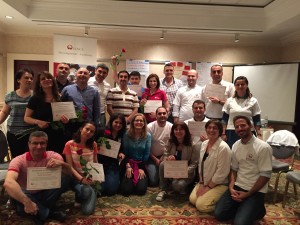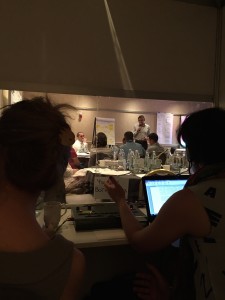 I recently returned from the Caucasus where I ran a customer experience program for a development bank. They had suffered a downturn; the result of a falling Russian currency, and the big banks coming in for a slice of their micro-lending pie.
I recently returned from the Caucasus where I ran a customer experience program for a development bank. They had suffered a downturn; the result of a falling Russian currency, and the big banks coming in for a slice of their micro-lending pie.
In my work coaching and facilitating in organisations around the world, the real change comes down to behaviour change. Anyone can do customer service, and it’s easy when things are running smoothly.
When things are challenging, when the customer is emotional, that’s the acid test of good customer service. Or not.
It was vital that we had support all the way from the top in this organisation. The first day was spent running a hybrid of the staff program with all the C suite and regional leaders from Azerbaijan, Georgia and Armenia.
An employee’s favourite sport is boss watching and this is a factor with regard to achieving any type of behaviour change. If you can see the leaders in your company leading the change, you will be more willing to follow along.
We were also wary that we had participants for both Armenia and Azerbaijan. Those two countries have been at war for 20 years and we weren’t too sure about how the participants would interact.
The big reason for the success of the program was the experiential component. All too often groups become complacent about learning if it’s ‘theoretical’ (e.g; packed with slides). To counter that, we put the spotlight on real time performance and behaviour.
The focus of the activities was the intelligent use of emotion in the customer experience. From earlier consultations with folks in the business, we designed case studies and role plays that brought to life the customer experiences that trigger poor responses from staff. The way participants reacted wasn’t always pretty, but they realised that each interaction with a customer leaves a mark.
 This intelligent use of emotion is the cornerstone of our efforts to influence and collaborate with our customers. We speak a lot about leaving an environmental footprint on our planet; in our business we have to ask ourselves what kind of emotional footprint we leave.
This intelligent use of emotion is the cornerstone of our efforts to influence and collaborate with our customers. We speak a lot about leaving an environmental footprint on our planet; in our business we have to ask ourselves what kind of emotional footprint we leave.
A quick program highlight from Tbilisi, Georgia: After a lunch break a participant wanted to play traditional music from the region. Spontaneously, two participants, one, a former soldier from Armenia, now a regional banking manager, took to the centre of the room on one knee as a female sales director from Azerbaijan spun around him clapping with arms above her head.
